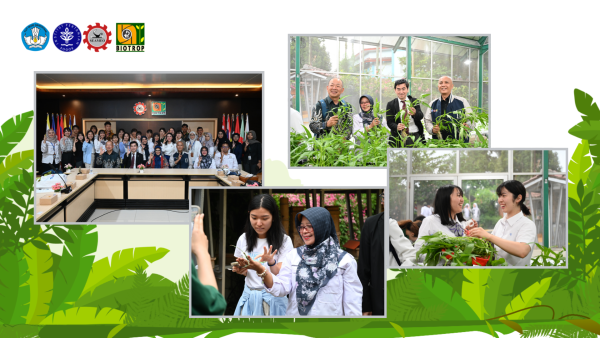Bogor, 5 July 2025 — SEAMEO BIOTROP welcomed a delegation from Japan, comprising students and educators from Sakado Senior High School, Ehime Senior High School, and the University of Tsukuba, for an official visit that culminated in the signing of a Memorandum of Agreement (MoA) between SEAMEO BIOTROP and Sakado Senior High School. The agreement signifies an important step in enhancing collaboration in the field of biodiversity education, particularly through the implementation of the School of Biodiversity program. This program aims to deepen students’ understanding of sustainability and biodiversity while supporting the integration of these concepts into school curricula, whether intra-curricular, extra-curricular, or co-curricular.
The delegation was received by SEAMEO BIOTROP’s Acting Director, Dr. Elis Rosdiawati, and Deputy Director for Program, Dr. Doni Yusri. In her welcoming remarks, Dr. Elis expressed her enthusiasm for the growing collaboration between institutions in Japan and Southeast Asia. “This collaboration is a meaningful step toward building a global network of schools and institutions committed to biodiversity and sustainability. We are proud to be part of the journey in shaping young minds to become future stewards of the environment,” she said.
As part of the visit, the participants were taken on a guided tour of SEAMEO BIOTROP’s Applied Education and Environmental Technology (AEET) facilities. The tour included stops at the hydroponic garden, stingless bee garden, mushroom house, aquatic garden, and tissue culture laboratory. These facilities showcased SEAMEO BIOTROP’s research-based approaches to biodiversity conservation and environmental sustainability, offering the visitors practical insights into real-world applications of science and education.
The group of 23 visitors included four students and two teachers from Sakado High School—Hira Hayakawa, Miki Shirai, Saira Saito, Toko Otsubo, Arum Octaviani Hadi Mulyono, and Yoshikazu Tatemoto—as well as four students and two teachers from Ehime High School—Momo Mitsumune, Sakura Okada, Maho Onishi, Shuma Jinno, Yuichiro Watanabe, and Taishi Yokoyama. Joining them were ten students and one professor from the University of Tsukuba—Lai Hong Wun, Adazawa Akiyu, Nishikubo Kohsuke, Nomoto Rie, Tajima Amane, Fukuda Ayano, Igarashi Kei, Suzuno Miki, Takeuchi Anmi, Zander Kaufmann, and Dr. Nakao Nomura.
Dr. Nakao Nomura, who led the university delegation, expressed his appreciation for the experience and the collaboration established during the visit. “SEAMEO BIOTROP is a living example of how biodiversity education can be both scientific and experiential. This partnership offers a unique opportunity for Japanese students to engage directly with biodiversity issues in Southeast Asia and develop meaningful cross-cultural perspectives,” he noted.
This visit and the formalization of the MoA reaffirm SEAMEO BIOTROP’s commitment to building international partnerships that foster environmental education and sustainable development. By engaging students and educators across cultures, the institution continues to play a vital role in shaping future leaders equipped with the knowledge and awareness needed to protect global biodiversity.
 Wednesday, 06 August 2025 on 6:05pm
Wednesday, 06 August 2025 on 6:05pm
